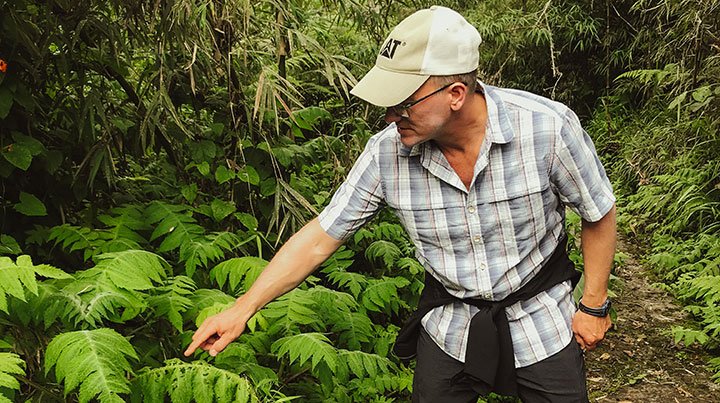Professor of Biology Thomas Walla, PhD, heads the 25-person team in hopes of winning a $10 million prize
The XPRIZE Rainforest project is a five-year competition funded by the Alana Foundation, with the goal to enhance the world’s understanding of the rainforest ecosystem in order to protect it. The project’s motto is “Discover. Understand. Preserve.” The winning team of the competition will receive a $10 million prize for their work.
The XPRIZE Rainforest project is now in its semifinal stage with just 15 teams left, who are based all around the world. One of these teams, Team Waponi!, is based out of Grand Junction, Colorado, and is led by Colorado Mesa University Professor of Biology Thomas Walla, PhD.
Originally the XPRIZE Rainforest project started with more than 300 teams interested globally, 60 of those went on to register and now only 15 teams are left with three based in the U.S.
Surprisingly Walla did not learn of the competition himself, but was referred to look into it by a colleague from another university. What started out as pure interest, led to him becoming Team Waponi!’s leader. He saw the competition as a way to allow CMU to expand their biology program and to build and strengthen outside connections.
Walla describes the XPRIZE Rainforest project as "A competition which looks for world problems that are on the cusp of being solved and puts this prize money in the middle and catalyzes professionals to come together from different disciplines to achieve something they never would have considered achieving before.”
The core purpose of the XPRIZE Foundation, he argues, is to draw attention to problems around the world and showcase these competitions on a global scale, extending an invite to scientists around the world and supplying them with a platform to promote their projects. In this specific project, teams are tasked with developing a method of measuring the value of rainforests, which XPRIZE could use to market the value to the bio economy which can be reinvested into measures that allow rainforest preservation.
Team Waponi! is a 25-person team comprised of scientists from various U.S. universities, as well as from countries throughout the world. Together the team has developed a solution they call the Limelight. It is a device that collects both audio and visual information. Essentially, the device will be drone delivered, attach itself to a tree and collect samples at different heights of the rainforest. Inside the device is a microphone and camera which will be used to locate and collect visual data on insects and auditory data on insects, mammals, birds and herpetofauna (reptiles and amphibians). The device will then send all the data it’s collected to a neural network system that will in turn identify and categorize the species into an extensive list.
Walla is not the only CMU faculty part of the project, as he has recruited the help of other departments on campus as well. Including biology faculty Johanna Varner, PhD, and Denita Weeks, PhD, and computer science faculty Sherine Antoun, PhD, and Karl Castleton, MS. CMU students have also gotten involved in this project, whether it’s taking pictures of insects or designing the understory exploratory vessel, the project has truly connected different disciplines.
Walla has been with CMU for more than 20 years and takes pride in involving students in his projects in order to enhance their life experiences and help them build a deeper appreciation for the world that surrounds them. “The best part of this [project] is to take CMU students that I’m working with now, and take their experience to a whole new level to solve world problems.”
His love for tropical ecology dates back to his first trip to Ecuador in 1991, since then he has returned over 10 times leading Tropical Field Biology courses to give his students the opportunity to live and work in the field alongside other professional biologists.
Team Waponi! has just one year until they will present their device and compete in Singapore for a finalist position.
